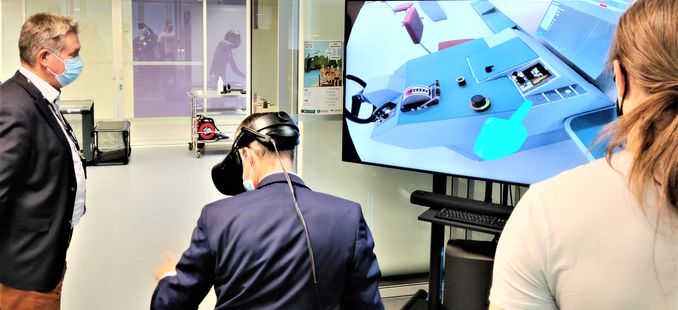
Joint research possibilities for autonomous seafaring
Director Carlos Jahn from the German innovation giant Fraunhofer CML visited Turku UAS and met our research groups. Fraunhofer CML is one of the leading maritime research institutions in Europe. Last week their research unit was opened in Turku, which was a cause for celebration.
“We presented to Prof. Jahn our research group and the activities of the FIT Turku (Futuristic Interactive Techologies) competence centre – in particular how our competence can be applied in seafaring. It was quite easy to present, as we have four ongoing, extensive projects in the field of autonomous seafaring”, says Mika Luimula, Principal Lecturer and Leader of the research group Futuristic Interactive Technologies.
The projects Luimula is referring to are Smart Terminals, which funded by Business Finland, similarly to the MarISOT project (Maritime Immersive Safe Oceans Technology); SmartCampus, which is funded by the Academy of Finland and ARPA – Applied Research Platform for Autonomous Systems , funded by the Ministry of Education and Culture.
Wireless technologies, cybersecurity and neural network systems were topics of interest
Turku University of Applied Sciences has gained internationally significant competence in autonomous seafaring. Of the four projects mentioned above, the research group Wireless Communications and Cybersecurity is involved in three. The research group is led by Executive Lecturer Jarkko Paavola.
As Carlos Jahn visited the premises of the 5G Test Network Turku, which is managed by Paavola, cooperation was discussed in terms of utilizing wireless technologies, such as 5G, in autonomous and remotely operated seafaring.
“We also planned the utilization of an open-source software platform, intended for sharing common cyber threat information, in increasing the cybersecurity level of vessels already in operative traffic”, Jarkko Paavola says.
Cooperation with the strong local industry is also included in the entity.
“It seemed like Jahn was very interested in sharing his experiences on the visit with his researchers and seek new cooperation opportunities now that Fraunhofer has opened a research unit in Turku”, says Mika Luimula.
Carlos Jahn himself got to test the navigation bridge application in the FIT Turku centre.
“Jahn was interested in the functionalities and realistic qualities of the application, in part because of our competence and in part because of the technologies we use. These include, among others, VR headsets by the Finnish Varjo. He was also very interested in the background system we had developed with its neural network and eye tracking solutions”, mentions Luimula.
A real tugboat in a remote operation test
Fraunhofer is about to start testing the remote user interface of a remotely operated tugboat, on a real tugboat instead of a small, radio-controlled vessel. Remote user interfaces and autonomous solutions are thus a joint, interesting research area we should focus on together now that Fraunhofer has come ashore in Turku.
The research platform Fraunhofer Innovation Platform for Smart Shipping - FIP-S2@Novia develops smart solutions for the seafaring industry together with the higher education institutions within Tech Campus Turku and companies in the field. The establishment of the Fraunhofer institute in Finland is a joint effort of Tech Campus Turku i.e., the City of Turku and the Turku-based higher education institutions, which has been prepared for a couple of years.
Read more on the research unit in our piece of news from June: German innovation giant Fraunhofer arrives in Turku
Get to know the research groups mentioned in the article:
•
Futuristic Interactive Technologies
•
Wireless Communications and Cybersecurity
Photo: Mika Luimula
In the photo Carlos Jahn is testing the navigation bridge application in the FIT Turku centre.


